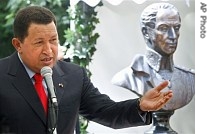-
(单词翻译:双击或拖选)
Moscow
28 June 2007
Venezuelan President Hugo Chavez is in Moscow for discussions with Russian President Vladimir Putin about a possible arms deal and expanded economic ties between the two countries. VOA Correspondent Peter Fedynsky reports from the Russian capital.
 |
| Hugo Chavez speaks at opening of Venezuela's cultural center in Moscow, 28 June 2007 |
Mr. Chavez says that Iran has the right to a peaceful atomic energy industry, because it is a sovereign state.
His Moscow agenda includes the possible purchase of Russian diesel-electric submarines, armed with missiles. Mr. Chavez is also interested in buying the Russian TOR-1 missile defense1 system.
Last year, Mr. Chavez signed a deal with the Kremlin to purchase $3 billion worth of weapons, including helicopters, fighter planes and small arms.
But Mr. Chavez said weapons are not the aim of his visit.
He says his priorities are culture, ideas and cooperation in energy as well as the military.
The two countries, both major exporters of energy, are discussing expanded commerce. Russian state television says bilateral2 trade, last year, amounted to only $90 million.
On Saturday, the Venezuelan leader will be President Putin's guest at a horse race in the southern city of Rostov-on-Don. However, despite signs of closer relations, Russian lawmakers voted against allowing Mr. Chavez to address them in a full session of the country's lower house of Parliament. The move is interpreted here as a way to avoid further aggravating3 the already chilly4 Russian relationship with the United States. The U.S. administration considers the Venezuelan leader a destabilizing voice in Latin America. Washington is also concerned about his international arms purchases.
Mr. Chavez has plans for more weapons deals with neighboring Belarus, where he flies after his visit to Russia. He then continues to Iran.
The Venezuelan's visit to Russia comes on the eve of President Putin's visit this weekend with President Bush at the Bush family home in Kennebunkport, Maine. The two leaders are expected to discuss ways of overcoming the recent chill in relations.
 收听单词发音
收听单词发音
1
defense

|
|
| n.防御,保卫;[pl.]防务工事;辩护,答辩 | |
参考例句: |
|
|
|
2
bilateral

|
|
| adj.双方的,两边的,两侧的 | |
参考例句: |
|
|
|
3
aggravating

|
|
| adj.恼人的,讨厌的 | |
参考例句: |
|
|
|
4
chilly

|
|
| adj.凉快的,寒冷的 | |
参考例句: |
|
|
|















